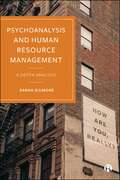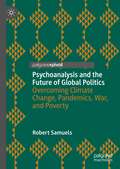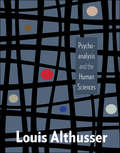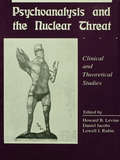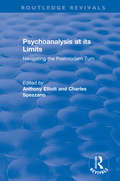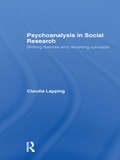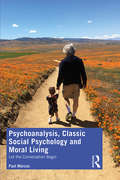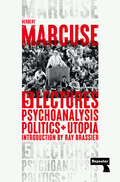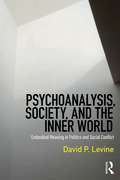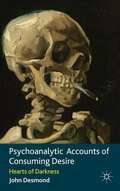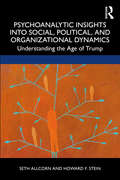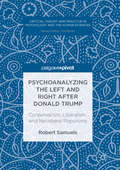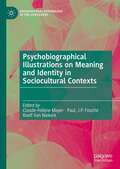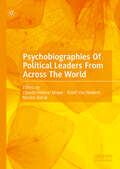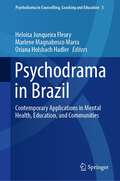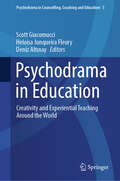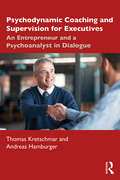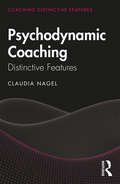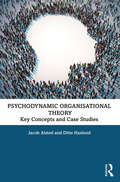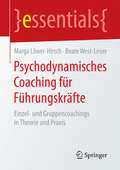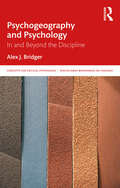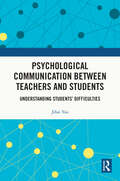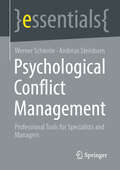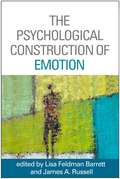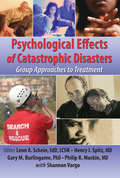- Table View
- List View
Psychoanalysis and Human Resource Management: A Depth Analysis
by Sarah GilmoreSince the 1980s, Human Resource Management (HRM) has risen to prominence as a highly influential area of practice and scholarship, yet critical examinations remain rare. This book applies psychoanalytic ideas to challenge HRM’s core theories and practices, exposing the dark side of organizational life and human motivation. By engaging with a broad range of psychoanalytic thinkers and theories, the book disrupts established perspectives and offers fresh insights into the field. Essential reading for scholars and practitioners, it reconfigures HRM as both an intellectual field and a site of organizational practice, offering a novel means of reshaping the ways in which we understand the subject.
Psychoanalysis and the Future of Global Politics: Overcoming Climate Change, Pandemics, War, and Poverty
by Robert SamuelsThis book offers a unique approach by using psychoanalytic theory to explain how we can resolve the most important issues facing the world today and in the future. One of my main arguments is that we need to move beyond national politics in order to provide global solutions to global problems. However, there is a misplaced fear concerning global governance, and much of this phobia is derived from a misunderstanding of history and human psychology. Not only do we have to learn to give up our idealized investment in nations and nationalism, but we also have to move beyond seeing the world from the perspective of a victim fantasy. Since we often repress real signs of global progress, we experience the global present and the future in negative ways. To reverse this perspective, we need to first understand the incredible progress humans have made in the last two hundred years, but we also should not ignore the real threats we face.
Psychoanalysis and the Human Sciences (European Perspectives: A Series in Social Thought and Cultural Criticism)
by Louis AlthusserWhat can psychoanalysis, a psychological approach developed more than a century ago, offer us in an age of rapidly evolving, hard-to-categorize ideas of sexuality and the self? Should we abandon Freud's theories completely or adapt them to new findings and the new relationships taking shape in modern liberal societies? In a remarkably prescient series of lectures delivered in the early 1960s, the French philosopher Louis Althusser anticipated the challenges that psychoanalytic theory would face as politics moved away from structuralist frameworks and toward the elastic possibilities of anthropological and sociological thought.Psychoanalysis and the Human Sciences translates Althusser's remarkable seminars into English for the first time, making available to a wider audience the origins and potential future of radical political theory. Althusser takes the important step in these lectures of distinguishing psychoanalysis from psychology and especially psychiatry, which long resisted Freud's analytical concepts of the unconscious and overdetermination. By freeing psychoanalysis from this bind, Althusser can then apply these analytical concepts to the social and the political, integrated with Marxist theory. The result is an enlivened methodology for comprehending social organization and change that had a profound influence on the Frankfurt School and scholars who continue to work at the forefront of radical thought today: Judith Butler, Étienne Balibar, and Alain Badiou.
Psychoanalysis and the Nuclear Threat: Clinial and Theoretical Studies
by Daniel Jacobs Howard B. Levine Lowell J. RubinThe analytic literature has heretofore been silent about the issues inherent in the nuclear threat. As a groundbreaking exploration of new psychological terrain, Psychoanalysis and the Nuclear Threat will function as a source book for what, it is hoped, will be the continuing effort of analysts and other mental health professionals to explore and engage in-depth nuclear issues. This volume provides panoramic coverage of the dynamic and clinical considerations that follow from life in the nuclear age. Of special interest are chapters deling with the developmental consequences of the nuclear threat in childhood, adolescence, and adulthood, and those exploring the technical issues raised by the occurrence in analytic and psychotherapeutic hours of material related to the nuclear threat. Additional chapters bring a psychoanalytic perspective to bear on such issues as the need to have enemies; silence as the "real crime"; love, work, and survival in the nuclear age; the relationship of the nuclear threat to issues of "mourning and melancholia"; apocalyptic fantasies; the paranoid process; considerations of the possible impact of gender on the nuclear threat; and the application of psychoanalytic thinking to nuclear arms strategy. Finally, the volume includes the first case report in the English language - albeit a brief psychotherapy - involving the treatment of a Hiroshima survivor. A noteworthy event in psychoanalytic publishing, Psychoanalysis and the Nuclear Threat betokens analytic engagement with the most pressing political and moral issue of our time, a cultivating of Freud's "soft voice of the intellect" in an area where it is desperately needed.
Psychoanalysis at its Limits: Navigating the Postmodern Turn (Routledge Revivals: Anthony Elliott: Early Works in Social Theory)
by Anthony Elliott Charles SpezzanoHas psychoanalysis become postmodern? How are the various schools of psychoanalysis being altered by postmodernism? What role does psychoanalysis have to play in the cultural debate in postmodern times? Originally published in 2000, Psychoanalysis at its Limits offers a stimulating account of the complex and contradictory nature of psychoanalysis in the postmodern age. It presents a history and critique of the concept of postmodernism throughout contemporary psychoanalytic thought. As such it is a critical survey of the complex relations between desire, selfhood and culture.
Psychoanalysis in Social Research: Shifting theories and reframing concepts
by Claudia LappingThe use of psychoanalytic ideas to explore social and political questions is not new. Freud began this work himself and social research has consistently drawn on his ideas. This makes perfect sense. Social and political theory must find ways to conceptualise the relation between human subjects and our social environment; and the distinctive and intense observation of individual psychical structuring afforded within clinical psychoanalysis has given rise to rich theoretical and methodological resources for doing just this. However, psychoanalytic concepts do not remain the same when they are rearticulated in the context of research. This book traces the reiteration and transformation of concepts in the psychoanalytic theory of Freud, Klein and Lacan, the social theory of Butler, Derrida, Foucault, Laclau and Zizek, and case studies of empirical research ranging from the classic Tavistock Institute studies to contemporary work in politics, gender studies, cultural studies and education. Each chapter explores one cluster of concepts: Melancholia, loss and subjectivity Overdetermination and free association Resistance, reflexivity and the compulsion to repeat Repression, disavowal and foreclosure Psychic defenses and social defenses Arguing against the reification of psychoanalytic concepts, Claudia Lapping suggests the need for a reflexive understanding of the play of attachments and substitutions as concepts are reframed in the contrasting activities of psychoanalysis and research.
Psychoanalysis, Classic Social Psychology and Moral Living: Let the Conversation Begin
by Paul MarcusIn Psychoanalysis, Classic Social Psychology and Moral Living: Let the Conversation Begin, Paul Marcus uniquely draws on psychoanalysis and social psychology to examine what affects the ethical decisions people make in their everyday life. Psychoanalysis traditionally looks at early experiences, concepts and drives which shape how we choose to behave in later life. In contrast, classic social psychology experiments have illustrated how specific situational forces can shape our moral behaviour. In this ground-breaking fusion of psychoanalysis and social psychology, Marcus gives a fresh new perspective to this and demonstrates how, in significant instances, these experimental findings contradict many presumed psychoanalytic ideas and explanations surrounding psychoanalytic moral psychology. Examining classic social psychology experiments, such as Asch’s line judgement studies, Latané and Darley’s bystander studies, Milgram’s obedience studies, Mischel’s Marshmallow Experiment and Zimbardo’s Stanford Prison Experiment, Marcus pulls together insights and understanding from both disciplines, as well as ethics, to begin a conversation and set out a new understanding of how internal and external factors interact to shape our moral decisions and behaviours. Marcus has an international reputation for pushing boundaries of psychoanalytic thinking and, with ethics being an increasingly relevant topic in psychoanalysis and our world, this pioneering work is essential reading for psychoanalysts, psychoanalytic psychotherapists, moral philosophy scholars and social psychologists.
Psychoanalysis, Politics, and Utopia: Five Lectures
by Herbert MarcuseAn impassioned plea for overcoming capitalism, whose urgency is more timely today than when it was first published fifty years ago.Back in print after fifty years and with a new introduction by Ray Brassier, this often overlooked but prescient collection of Marcuse's lectures makes an impassioned plea for the overthrowing of capitalism.Analysing the work of Freud and Marx, and taking in topics like automation, work, postcapitalism, utopia, and technology, Psychoanalysis, Politics, and Utopia excavates the psychic roots of the current crisis of capitalist civilisation, and gives us a blueprint for the emancipation of humanity from the toils of capitalism.In a world reeling from the ongoing collapse of the neoliberal consensus, coupled with the accelerating pace of catastrophic climate change wrought by capitalism, Marcuse&’s radical insights in Psychoanalysis, Politics, and Utopia are as urgently relevant today as they were in 1970.
Psychoanalysis, Society, and the Inner World: Embedded Meaning in Politics and Social Conflict
by David P. LevinePsychoanalysis, Society, and the Inner World explores ideas from psychoanalysis that can be valuable in understanding social processes and institutions and in particular, how psychoanalytic ideas and methods can help us understand the nature and roots of social and political conflict in the contemporary world. Among the ideas explored in this book, of special importance are the ideas of a core self (Heinz Kohut and Donald Winnicott) and of an internal object world (Melanie Klein, Ronald Fairbairn). David Levine shows how these ideas, and others related to them, offer a framework for understanding how social processes and institutions establish themselves as part of the individual’s inner world, and how imperatives of the inner world influence the shape of those processes and institutions. In exploring the contribution psychoanalytic ideas can make to the study of society, emphasis is placed on post-Freudian trends that emphasize the role of the internalization of relationships as an essential part of the process of shaping the inner world. The book’s main theme is that the roots of social conflict will be found in ambivalence about the value of the self. The individual is driven to ambivalence by factors that exist simultaneously as part of the inner world and the world outside. Social institutions may foster ambivalence about the self or they may not. Importantly, this book distinguishes between institutions on the basis of whether they do or do not foster ambivalence about the self, shedding light on the nature and sources of social conflict. Institutions that foster ambivalence also foster conflict at a societal level that mirrors and is mirrored by conflict over the standing of the self in the inner world. Levine makes extensive use of case material to illuminate and develop his core ideas. Psychoanalysis, Society, and the Inner World will appeal to psychoanalysts and to social scientists interested in psychoanalytic ideas and methods, as well as students studying across these fields who are keen to explore social and political issues.
Psychoanalytic Accounts of Consuming Desire
by John DesmondProvides an accessible introduction to psychoanalytic explanations of consumer desire. Topics are drawn widely to reflect the scope of Freud's vision and include dreams, sexuality and hysteria. Discussion is widened to selectively include authors such as Melanie Klein and Jacques Lacan, and to include evaluation of current research.
Psychoanalytic Insights into Social, Political, and Organizational Dynamics: Understanding the Age of Trump
by Seth Allcorn Howard F SteinThis fascinating interdisciplinary work explores U.S. politics since 2015 and offers psychodynamic insights into the unconscious undercurrents of contemporary culture and politics in the United States. Allcorn and Stein expertly lead readers up the steep learning curve of understanding the Trump era by exploring seven key elements of recent political dynamics. Using the complementary psychodynamic models of object relations, Group Relations and Karen Horney’s tripartite theory, this book makes sense of the Age of Trump and its chaotic world of alternate facts, conspiracy theories, reality TV politics, hoax pandemics, and the sweeping chaos of life in the United States. This sense-making relies on two triangulations. The first represents the complex systemic political scene. The second uses three psychoanalytic theories to understand social, political, and organizational dynamics. This book is a key resource for helping readers know and understand ourselves, our fellow citizens, colleagues, family, friends and what Trump and his followers call "them" such as liberals and foreign immigrants, as well as both the larger polarized social and political context in the United States today. The book also provides concrete examples of how these discoveries can be operationalized both in organizations and at the level of national government and leadership. This book is an essential reading for students in organizational behavior including leadership and how governments operate, as well as behavioral health professionals consulting or offering therapy to organizations.
Psychoanalyzing the Left and Right after Donald Trump
by Robert SamuelsThis book outlines a new model for global social justice movements that is based on Freud and Lacan's central insights regarding the unconscious, repetition, drives, and transference. Since most of our current social issues are global in nature, Bob Samuels convincingly argues that we need a global solution, but that global solidarity is blocked by narcissistic nationalism and the capitalist death drive. In examining contemporary social movements for global justice, Samuels articulates a comprehensive theory of non-pathological social solidarity, and argues that in the age of multinational corporations and global climate change, we need a new model of global justice and government that requires an understanding of analytic neutrality and free association. This book uses psychoanalytic theories and practices to explain how someone like Trump can rise to power, and explores why liberals have failed to provide a convincing or effective political alternative. It will be compelling reading to students and teachers in a range of psychological and political disciplines, and to anyone interested in psychoanalysis and current politics.
Psychobiographical Illustrations on Meaning and Identity in Sociocultural Contexts (Sociocultural Psychology of the Lifecourse)
by Claude-Hélène Mayer Paul, J. P. Fouché Roelf Van NiekerkThis book explores psychobiography with focus on meaning making and identity development in the life and works of extraordinary individuals. Meaning-making and identity development are existential constructs influencing psychological development, mental health and wellbeing across the lifecourse. The chapters illustrate through the eyes of 25 international psychobiographers various theoretical and methodological approaches to psychobiography. They explore how individuals, such as Angela Merkel, Karl Lagerfeld, Henri Nouwen, Vivian Maier, Charles Baudelaire, W.E.B. du Bois, Loránt Hegedüs, Kim Philby, Zoltan Paul Dienes, Albertina Sisulu, Ruth First, Sokrates, and Jesus construct their lives to make meaning, develop their identities and grow as individuals within their sociocultural contexts. The texts provide deep insight into life’s development.
Psychobiographies Of Political Leaders From Across The World
by Claude-Hélène Mayer Roelf Van Niekerk Moshe BanaiThe authors explore the life and leadership of extraordinary political leaders in different socio-cultural contexts and epochs and present new insights in political psychobiography. They investigate the lives, personalities, politics, philosophies, careers, leadership and leadership styles of leaders from the UK, Germany, France, South Africa, China, Turkey and Zimbabwe and lead discourses on the advancement of contemporary theories and methodologies. A must read to understand leaders and leadership in historical, contemporary, cultural and intercultural perspectives!
Psychodrama in Brazil: Contemporary Applications in Mental Health, Education, and Communities (Psychodrama in Counselling, Coaching and Education #3)
by Heloisa Junqueira Fleury Marlene Magnabosco Marra Oriana Holsbach HadlerThis book approaches contemporary psychodrama from many contexts and population application from different regions of Brazil. It presents the diversity of local culture, the originality with which psychodramatic philosophy emerges in the Brazilian scenario. It introduces the theoretical-methodological procedures that reaffirm psychodrama as a scientific instrument of social action. The chapters cover the philosophical and theoretical foundations and the new socio-psycho-educational methodologies applied in clinical practices, sociotherapy, politics and society. It is a helpful resource for professionals and academics interested in the development of innovative applications of Psychodrama.
Psychodrama in Education: Creativity and Experiential Teaching Around the World (Psychodrama in Counselling, Coaching and Education #5)
by Scott Giacomucci Heloisa Junqueira Fleury Deniz AltınayThis comprehensive volume synthesizes decades of experience from psychodrama educators around the world. It provides theoretical foundations for practice and presents a diverse range of educational tools suitable for various types of learners. It approaches the educational field with creativity and innovation, presenting different models from diverse educational settings. The chapters include psychodramatic techniques in education. It addresses the needs of educators with different cultural backgrounds and provides specific resources tailored to educational fields such as helping professionals, organizations, lawyers, human development, and education. Each chapter stands alone as a complete resource while forming an interconnected part of the book. The book emphasizes the value of creative and action-oriented methods in engaging students, offering updated tools based on extensive research and the lifelong experiences of professionals from diverse geographical and cultural backgrounds. With its wealth of practical insights and innovative approaches, this book equips educators with the necessary tools to enhance their teaching practices and create transformative learning experiences for students. The book interests university professors, teachers, graduate students, educators, and trainers across various disciplines.
Psychodynamic Coaching and Supervision for Executives: An Entrepreneur and a Psychoanalyst in Dialogue
by Andreas Hamburger Thomas KretschmarThomas Kretschmar and Andreas Hamburger provide an important overview of psychodynamic work in companies, presenting different viewpoints and explaining key psychoanalytic terms and techniques for coaching and supervision. Written in the form of a dialog between Kretschmar, an entrepreneur, and Hamburger, a psychoanalyst, the book provides unique insight into psychodynamic coaching and supervision. Psychodynamic Coaching and Supervision for Executives begins with an overview of coaching, psychodynamic approaches, the unconscious and relevant psychoanalytic theory. Kretschmar and Hamburger then consider Operationalized Psychodynamic Diagnosis (OPD) in business, assess current research into coaching and supervision and present a selection of key case studies. At the end of each chapter, the authors compare their positions, giving important contextual information, exploring objections, complications and improvements, and providing a precise summary of the topic. This book will be an illuminating guide for therapists and professionals who wish to learn how psychoanalytic theory and practice can be used for coaching, counseling and supervision in an organizational context.
Psychodynamic Coaching: Distinctive Features (Coaching Distinctive Features)
by Claudia NagelIn Psychodynamic Coaching: Distinctive Features, Claudia Nagel presents a comprehensive overview of the unique features of psychodynamic coaching. As leaders and managers acknowledge the need to understand themselves and their context by looking underneath the surface to improve their decision-making, psychodynamic approaches offer unique insight. Psychodynamic Coaching: Distinctive Features covers not only the major theory but also the practice of coaching, giving guidance from beginning to end of the client relationship. Constructive, holistic and accessible, it demonstrates the impact and dynamics of the unconscious whilst illustrating the power of understanding human behaviour in the complexity of the modern world. With a focus on emotions and relationships in supporting modern leaders adapting to organsational challenges, this book will be an invaluable tool for coaches of all backgrounds, academics and students of coaching and organisational behaviour, and also clinicians. It will also be a key resource for senior leaders for their own personal growth.
Psychodynamic Organisational Theory: Key Concepts and Case Studies
by Jacob Alsted Ditte HaslundOn the surface, people go to work and come home again. They sometimes manage people while most are managed themselves. But beneath the function and structures of the work itself, a whole range of emotions affects the success of the relationship between employee and manager and ultimately the organisation they both belong to. Psychodynamic Organisational Theory: Key Concepts and Cases provides a comprehensive but accessible introduction to this fascinating field of study. Featuring case vignettes which bring the various concepts to life, the book is divided into four parts. Part I looks at how the individual relates to the organisation and the unconscious energies they bring, while Part II examines group dynamics and how they affect productivity, including a chapter on meetings. Part III explores the realm of leadership and what roles a manager can play in managing their staff, while Part IV introduces the idea of personality and describes how the manager’s personality influences management dynamics as well as the wider organisational culture. Central to the book, as well as the idea that organisational phenomena are often unconscious, is the understanding that relationships are always reciprocal. Through complex psychological dynamics manager and employee influence and change each other during the process of managing and being managed. This text will be essential reading for students and scholars of leadership, HRM, and organizational psychology, as well as consultants and managers looking for practical insights into how human relationships affect the success of every organisation.
Psychodynamisches Coaching für Führungskräfte: Einzel- und Gruppencoachings in Theorie und Praxis (essentials)
by Beate West-Leuer Marga Löwer-HirschDieses essential bietet Einblicke in die Praxis des psychodynamischen Leadership-Coaching, welche gestützt werden durch authentische Beispiele aus der Beratungspraxis der Autorinnen. Die Kernkompetenzen des Führens werden von unbewussten Dynamiken gesteuert. In der Beziehung zum Coach können diese entdeckt und integriert werden. Der innere Handlungsspielraum erweitert sich, sowohl im psychodynamischen Einzel- wie auch im Gruppencoaching auf je unterschiedliche Weise.
Psychogeography and Psychology: In and Beyond the Discipline (Concepts for Critical Psychology)
by Alex J. BridgerPsychogeography usually refers to radical and artistic ways of walking or to a conflation of psychology with geography. In this unique work, the author makes arguments for considering psychogeography as a way to critique the contemporary world and to consider new ways of studying the interface of human beings in environments. The book begins by introducing and explaining the term psychogeography from a range of academic, activist, and artistic perspectives. Each chapter presents different approaches to doing psychogeography and there are arguments presented for why there is a need for a postpsychology. The author takes a creative and innovative approach to psychogeography by extending walking methods of research to include other forms of practice and research including playwriting and wargaming. The only book written on psychogeography from a psychological perspective, this book will appeal to researchers and students of psychology, geography, architecture, and cultural studies as well as artists, activists, and the public.
Psychological Communication Between Teachers and Students: Understanding Students’ Difficulties
by Jihai YaoPsychological communication between teachers and students is the essence of formal education. This book focuses not only on analyzing problems from the perspective of teachers but also from the perspective of students and provides educators with ways to communicate effectively with their students.It is necessary for teachers to be concerned with cultivating and stimulating the internal motivation of students’ development. This book discusses the significance of psychological communication and effective communication between teachers and students, the psychological preconditions of communication between them and strategies that teachers can utilize to communicate more effectively with their students. In addition, the author provides a large number of cases, psychological tests and exercises to help teachers have a better understanding of themselves, their students and to find more effective working methods, while establishing a democratic, equal and harmonious interpersonal relationship between them.Communication between teachers and students is an essential and indispensable component during the process of teaching and learning. This book thus will be of interest to teachers, students, and researchers of educational psychology, education management and those who are interested in teachers' professional development in general.
Psychological Conflict Management: Professional Tools for Specialists and Managers (essentials)
by Werner Schienle Andreas SteinbornDo you want to handle conflicts (even) better? Do you want to know how to assert your interests without leaving a trail of broken relationships with colleagues, superiors, employees, or even in your social and friend circles? Here, you will find the answers. In this second edition of the essentials, which has already established itself as a standard work in its first edition, you will not only find a wealth of practical and easily applicable tools for everyday use, but you will also gain valuable insights into human thought and perception processes that promote conflict. Considering these insights will make your life much easier. Less petty conflicts, and more time and energy for your actual tasks.
Psychological Construction of Emotion
by James A. Russell Lisa Feldman BarrettThis volume presents cutting-edge theory and research on emotions as constructed events rather than fixed, essential entities. It provides a thorough introduction to the assumptions, hypotheses, and scientific methods that embody psychological constructionist approaches. Leading scholars examine the neurobiological, cognitive/perceptual, and social processes that give rise to the experiences Western cultures call sadness, anger, fear, and so on. The book explores such compelling questions as how the brain creates emotional experiences, whether the "ingredients" of emotions also give rise to other mental states, and how to define what is or is not an emotion. Introductory and concluding chapters by the editors identify key themes and controversies and compare psychological construction to other theories of emotion.
Psychological Effects of Catastrophic Disasters: Group Approaches to Treatment
by Philip R. Muskin Joseph Rose Henry I Spitz Leon Schein Gary BurlingameA thorough, user-friendly guide of basic knowledge and group interventions for psychological trauma from terrorist attacks and other catastrophic disastersThere is relatively little literature on the psychological trauma caused by catastrophic disasters, including terrorist attacks and the impending threats of terrorism. Psychological Effects of Catastrophic Disasters: Group Approaches to Treatment fills that gap by comprehensively discussing ways to minimize the psychological damage resulting from catastrophic disasters as well as the trauma developed from the threat of future terrorist attacks. The book provides thorough presentations of almost manualized group methods for the prevention and treatment of the acute and longer-term psychological effects for children, adolescents, and adults.Appropriate treatment immediately after a catastrophe can diminish harmful psychological effects, enhance an individual&’s quality of life, decrease psychosomatic illnesses and the exacerbation of chronic medical conditions, increase the effective utilization of medical facilities, and decrease medical expenses. In this book, internationally renowned authorities provide practical expert suggestions and helpful examples to illustrate the interventions and provide a quick reference for professionals facing the aftermath of prospective terrorist disasters and other catastrophic events. Psychological Effects of Catastrophic Disasters: Group Approaches to Treatment is divided into four sections. The first section provides an overview of the book; the second discusses the foundations and broad issues which potentially affect the outcome of group treatment; the third section presents group models which address the particular needs of children, adolescents, parents, emergency service personnel, and mental health practitioners; and the fourth part considers future directions of treatment. Designed to be used as a comprehensive single source for professionals working with victims of trauma caused by terrorism or catastrophic disaster, this book can be read and used in its entirety, or specific chapters detailing treatments can be chosen and used independently as needed. Extensive references allow opportunities for further research.Psychological Effects of Catastrophic Disasters: Group Approaches to Treatment presents unique first-person accounts of September 11th and examines: the neurobiological effects of a traumatic disaster the effective use of psychotropic medication the implications of living with ongoing terrorist threats a new framework for preparedness and response to disasters and trauma for children and families cultural, religious, and ethnic differences related to the prevention and treatment of psychological sequelae the diagnosis and treatment of traumatic grief retraumatization, distressing reminders, and their effects on post-traumatic adjustment the knowledge trauma therapists need to integrate small group principles the diagnosis and group treatment of acute and long-term effects with adults and children the use of spiritual principles after a terrorist disaster or catastrophic event nine types of groups appropriate for specific populationsPsychological Effects of Catastrophic Disasters: Group Approaches to Treatment is a timely, comprehensive reference for social workers, psychologists, psychiatrists, health professionals, mental health professionals, educators, and students.The royalties from this book shall be donated to organizations which provide direct services to those who continue to be affected by the events of September 11th, 2001 and Hurricane Katrina (August 29th, 2005).
